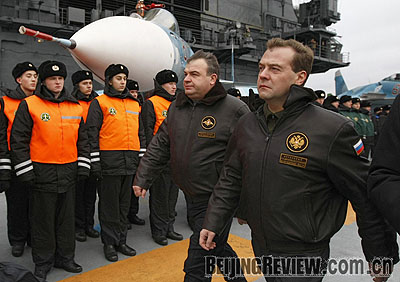|

ABOARD: Russian President and Supreme Commander Dmitry Medvedev (right) and Defense Minister Anatoly Serdyukov inspect the aircraft carrier Admiral N. Kuznetsov in the Barents Sea during a military exercise outside Murmansk on October 11 (XINHUA/AFP)
Will Dmitry Medvedev deviate from predecessor Vladimir Putin's planned route for Russia? The new Russian president gestured a firm "no" in his first state of the nation speech.
Medvedev, who took office in May, delivered the speech at the Federal Assembly on November 5. The speech covered issues ranging from domestic issues to worldwide conflicts, and it indicated that Putin's policies would carry over to Medvedev's presidency.
Medvedev stressed that Russia should continue political and economic reforms, but he alarmed his international audience with the suggestion that a presidential term be extended to six years from four. In exchange, Medvedev proposed giving the State Duma, the lower house of parliament, stronger check over executive bodies.
"These proposals are certain to be approved, because the Putin-led United Russia party now has two thirds of the seats in the State Duma," said Wang Lijiu, a researcher on Russian studies at the China Institutes of Contemporary International Relations.
He explained the reasons for Medvedev's proposal, which would also extend four-year parliamentary terms by one year. When the current Russian constitution was approved in 1993, Russian leaders were looking to the West for political models. For example, presidential terms in the United States and Russia are both four years. Russian critics say that presidential elections every four years leave voters exhausted, in addition to costing a lot of money, energy and time. Besides, Russian leaders found that a shorter term often limits how much they can achieve, Wang said. According to a Xinhua report, Finance Minister Alexei Kudrin said that with a longer presidential term, "pre-election squabbles will happen less frequently," and it would be a "good period for any president to prove himself both in the economic and political fields."
Some media predicted that Medvedev's proposal to extend the presidential term would pave the way for Putin to return as president. There is no limit on total terms for Russian presidents, but they cannot serve more than two consecutive terms. One newspaper speculated that Medvedev could resign as early as next year and call an early presidential election.
Wang did not dismiss the possibility, but he considers it unlikely. He pointed out that the Medvedev and Putin camps cooperate quite well, and both men enjoy solid reputations among the Russian people. According to a recent poll, Medvedev's approval rating tops 70 percent, while Putin has more than 80 percent support in his post as prime minister. Medvedev inherited Putin's policies and is firmly carrying them out. "Political leaders like Putin care more about the continuity of their policies than just a post," Wang said.
| 